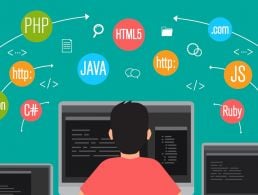A new survey of 1,000 people in Ireland has found that more than half believe coding should be introduced to the school curriculum at both secondary and primary levels.
Not just that, but the ages of nine and 10 are ideal for the learning of basic coding, with 70pc of those asked saying coding should be introduced to children at some stage between the ages of six and 12. Coding for kids is the way to go, clearly.
The survey, conducted by Amarach Research and commissioned by UPC to celebrate Tech Week, found that the younger generation knew more about coding than the elderly, with awareness of different coding languages highest among those aged 25 to 34.
“Our study into the importance of computer coding for young people has shown that there is a significant appetite for the formal introduction of computer coding into the school curriculum for primary and secondary education,” says Anna-Maria Barry, corporate communications GM for UPC Ireland.
Barry, who also helps out with CoderDojo clubs, says it’s now evident that the majority of people believe it should happen before children reach their teenage years.
“Through our partnership with CoderDojo, we aim to give more and more young people the opportunity to learn coding skills that will help them become the next generation of creators and innovators.
“We’re delighted also to be once again supporting CoderDojo’s Coolest Projects Awards 2015. This will see members of local coding clubs or dojos, aged seven 7 to 17, coming together to showcase the application of skills and knowledge they have gained from attending their weekly coding sessions.”
Child programming image, via Shutterstock




